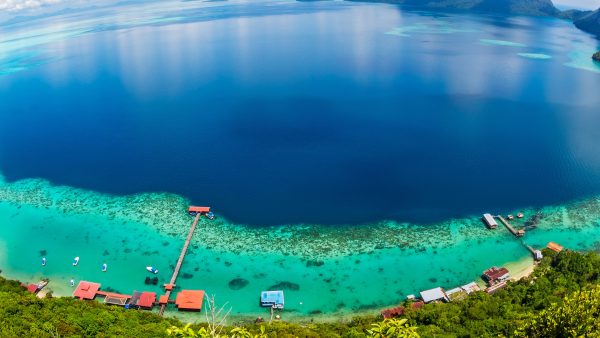KOTA KINABALU: The concept of community-based tourism (CBT) should be expanded to water communities to develop new tourism products with a distinct experience, said Assistant Minister of Tourism, Culture, and Environment Datuk Joniston Bangkuai.
He made the comments during a 5 September briefing on Project Picasso led by the non-governmental organisation Meraki Daat Sabah Initiative, which aims to transform identified water villages into Instagram-worthy tourist attractions. Present were Meraki Daat’s president Michelle De La Harpe, and honorary secretary, Winterlyn Deypalan.

The project, set to begin in 2023, aims to paint stilt houses in creative ways and to work with the Sabah Tourism Board to promote tourism water village destinations.
“This approach will aid in cleaning up and transforming water villages into thriving tourist destinations where the emphasis is placed heavily on cleanliness,” Joniston said. “Particularly in the rural areas, Sabah has demonstrated strong success in the area of CBT. Since 2014, we’ve noticed a rise in rural communities’ interest in operating CBT.
“Water villagers can benefit from this concept as it will teach them how to work as a team to create sustainable income for the community and to conserve the environment,” explained Joniston, who is also chairman of the Sabah Tourism Board.
Joniston said Meraki Daat’s commitment bodes well for his Ministry and the Sabah Tourism Board’s goal of empowering local communities through tourism.
In the meeting, De La Harpe briefed Joniston on the newly founded association and presented her dedicated team of executive members from across the nation who share a similar passion for the ocean.
Founded and registered in July 2022, ‘Meraki’ is a Turkish-derived Greek word with the meaning to infuse spirit, creativity, and love into something, while ‘Daat’ is a Kadazan word for ocean. Project Picasso is Meraki Daat’s flagship initiative, which entails teaching locals about proper waste segregation, sanitation, and treatment facilities, as well as recycling and upcycling.
Repairing and repainting water village houses with murals based on artwork submitted from people all over the world, as well as opening up new enterprises like cafes, sales of handicrafts, and even homestays, are all part of the plan.
Having been a CBT pioneer, Joniston shared the initial challenges faced in introducing it to the local community and the lessons learnt along the way to making it as successful as it is today.
“We were informed by a Universiti Putra Malaysia professor that Sabah has over 20,000 houses on stilts. We hope to start (Project Picasso) in the state capital seeing that it would be ideal in terms of logistics, sustainability and creating an additional tourist attraction within the city,” said the Meraki Daat president. “Although the objectives and strategy have been set in place, it will still be subject to the cooperation of the local community identified”.
Certain water villages, she added, are currently an eyesore, and Meraki Daat hopes to transform them into the most talked-about destination in the region by gaining the support of both the ministry and local councils. She stated that the project’s groundwork has already begun and that the public can stay up to date on progress and contribute in various ways, including manpower and funding, via their website www.merakidaat.org and social media pages.
(Your Stories: Sabah Tourism Board)






